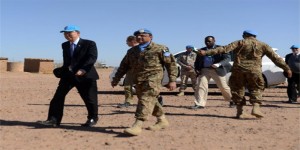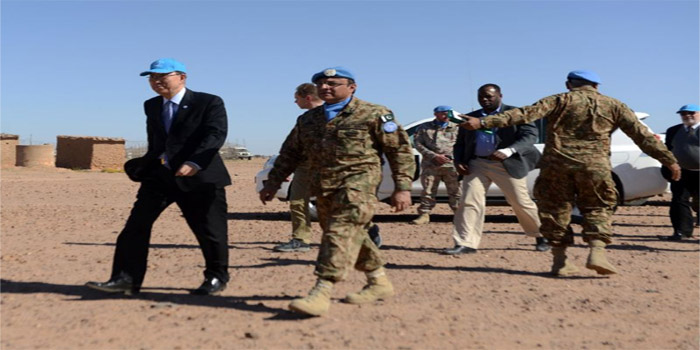Gulf News Report

Dubai: Tension flared between Morocco and UN Secretary General Ban Ki-moon as the two sides engaged in a bitter war of words regarding the situation in the Sahara.
The tension started on March 5 when Ban referred to Morocco’s “occupation” of the Sahara during a visit to a camp of refugees in Tindouf, in the western part of Algeria.
Morocco promptly condemned Ban’s comments in strong terms, saying they were contrary to Security Council resolutions, a breach of the UN’s supposed neutrality and dangerously damaging to the credibility of the UN secretary-general.
“The Government of the Kingdom of Morocco expresses its strongest protest following the remarks made by the UN Secretary-General Ban Ki-moon during his recent visit to Tindouf and Algiers on the Sahara issue,” Morocco said in a statement carried by the official news agency (MAP).
“His comments are politically inappropriate, unprecedented, and contrary to Security Council resolutions. It is with great amazement that the Moroccan government takes note of the verbal excesses, the fait accompli and unjustified complacency gestures of the UN secretary-general during his visit to the region. Morocco has seen, both in terms of the conduct of the visit and the content of the statements, that the Secretary General has abandoned his neutrality, objectivity and impartiality.”
Morocco also regrets that the UN secretary-general has yielded to the blackmail of the other parties by following the fait accompli in violation of the commitments and guarantees he gave to Morocco and that he gives credit to the false claims of the other parties, the statement added.
“It is with amazement that the Secretary General used the term ‘occupation’ to describe the recovery by Morocco of its territorial integrity. This departs from terminology traditionally used by the United Nations in the Moroccan Sahara,” the statement said.
“This type of semantic slippage dangerously undermines the credibility of the UN secretary-general. These outrageous words hurt the feelings and dignity of the entire Moroccan people.”
On Sunday, up to three million people, according to Moroccan authorities, took out to the streets in the capital Rabat after political parties, unions and non-governmental groups called for a national demonstration in reaction to Ban’s comments.
Media reports said that the protesters, holding portraits of King Mohammad II and Moroccan flags, chanted the “The Sahara is ours, the King is ours” as they packed the streets near the parliament building.
Head of the Government Abdul Ilah Benkirane, the leader of the Justice and Development Party, told the London-based daily Asharq Al Awsat that the rally in Rabat reflected the citizens’ trust in their king and in the justice and legitimacy of their country.
The rally exceeded all expectations especially that it was arranged in only two days, he said, adding that Moroccans were not looking for problems with the UN secretary-general, but were not willing to give up their historical, constitutional and religious rights, either.
Benkirane said that Moroccans could accept diplomatic concessions, which have been offered by Morocco for over 40 years now in order to find solution to the conflict, but could never accept the description of their country as “occupier”.
To them, Morocco is a red line that should not be crossed, he told the daily.
However, the following day, Ban said he was angered and disappointed by the demonstration that he said was a personal attack on him.
Ban “conveyed his astonishment at the recent statement of the government of Morocco and expressed his deep disappointment and anger regarding the demonstration that was mobilized on Sunday, which targeted him in person,” Ban’s press office said.
“He stressed that such attacks are disrespectful to him and to the United Nations,” said the statement, which was issued after he met Moroccan Foreign Minister Salah Al Deen Mezouar.
The United Nations acknowledges he used the term, and the statement on Monday said there was a misunderstanding over his use of the word “occupation,” noting it was Ban’s “personal reaction to the deplorable humanitarian conditions in which the Sahrawi refugees have lived in for far too long.”
According to the statement, Ban asked Mezouar for “clarification regarding the reported presence of several members of the Moroccan government among the demonstrators.”
The dispute over the region in the northwest edge of Africa has dragged on since Morocco took control over most of it in 1975 after the withdrawal of former colonial power Spain.
The Polisario Front, which says the territory belongs to ethnic Sahrawis, fought a war against Morocco until a UN-brokered ceasefire in 1991, but the two sides have since been deadlocked.
Polisario, backed by Morocco’s regional rival and neighbour Algeria and a number of other African states, wants a referendum promised in the ceasefire agreement on the region’s fate.
Morocco says it will not offer more than autonomy for the region, rich in phosphates and possibly offshore oil and gas.
— Compiled from agencies







